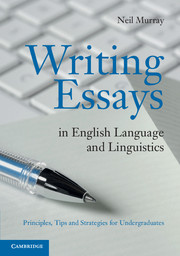 Writing Essays in English Language and Linguistics
Writing Essays in English Language and Linguistics Book contents
- Frontmatter
- Contents
- Acknowledgements
- Introduction
- A guide to the book's icons: what do they mean?
- Part 1 The basics
- Part 2 Getting down to writing
- Chapter 3 Analysing and answering the question
- Chapter 4 The writing process
- Chapter 5 Writing an introduction
- Chapter 6 Writing the body of your essay
- Chapter 7 Writing summaries and conclusions
- Chapter 8 Referencing and quotations
- Chapter 9 Stylistic issues
- Chapter 10 Writing up small-scale research projects or dissertations
- Frequently asked questions
- Linguistics glossary
- Task key
- References
- Index
Chapter 9 - Stylistic issues
from Part 2 - Getting down to writing
Published online by Cambridge University Press: 05 June 2012
- Frontmatter
- Contents
- Acknowledgements
- Introduction
- A guide to the book's icons: what do they mean?
- Part 1 The basics
- Part 2 Getting down to writing
- Chapter 3 Analysing and answering the question
- Chapter 4 The writing process
- Chapter 5 Writing an introduction
- Chapter 6 Writing the body of your essay
- Chapter 7 Writing summaries and conclusions
- Chapter 8 Referencing and quotations
- Chapter 9 Stylistic issues
- Chapter 10 Writing up small-scale research projects or dissertations
- Frequently asked questions
- Linguistics glossary
- Task key
- References
- Index
Summary
‘I worry about how I'm expected to write at uni – you know, how formal I should be, whether there's a special style and so on. I worry that my school essays haven't prepared me.’
Much of this book has looked at basic principles of researching and structuring your writing in English language and linguistics. This chapter looks at one other key ingredient that is necessary if your work is to ‘feel right’ and conform to the expectations of your discipline and therefore those of your lecturers and examiners as well: good style. Your writing must consistently demonstrate an academic style that is not only engaging but appropriate. While we've considered some of the factors that can help make your writing engaging (e.g. sound and incisive critical analysis, well-articulated reasoning, original thinking, the effective use of thesis statements and examples), it's important to remember that the choices you make as you strive for a style that's also appropriate are equally if not more important, for, ultimately, they can make the difference between an exceptional piece of work and one that's mediocre, even poor.
Concision and clarity
Although we looked at concision in section 2.5, it is worth revisiting it briefly here in the light of its importance to good academic writing. Concision, you'll recall, means keeping your writing brief and to the point, and avoiding waffle and the inclusion of information that's peripheral to your main discussion and which doesn't have a direct and immediate bearing on it. Such information is likely to be seen by the reader as irrelevant and an unnecessary distraction.
- Type
- Chapter
- Information
- Writing Essays in English Language and LinguisticsPrinciples, Tips and Strategies for Undergraduates, pp. 136 - 158Publisher: Cambridge University PressPrint publication year: 2012


